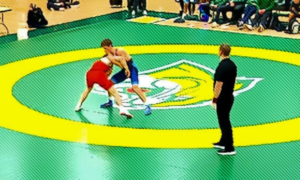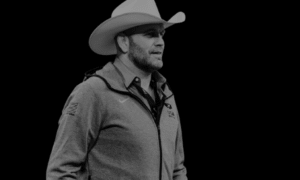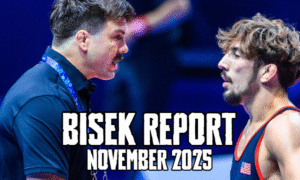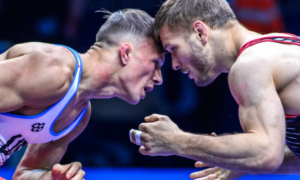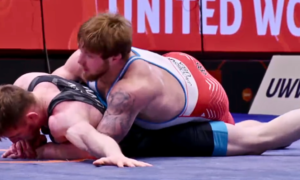Five Point Move is proud to host US Greco Roman National Team Head Coach Matt Lindland every week for “Coach Lindland’s Report.” For fans and wrestlers looking for insights regarding the US Greco National Team, we ask Coach Lindland some questions to get his take on training and upcoming competitions. If you have any questions you’d like us to ask going forward let us know via Facebook, Twitter, or through our Contact page.
This week, Coach Lindland is getting ready to head over to Minnesota for workouts with the Minnesota Storm before attending the Alan and Gloria Rice Hall of Fame ceremony on Saturday. Topics for this week’s edition include selecting coaches for the new tour schedule and how that works; Andy Bisek filling in for Hermann at Northern next week; and the debate regarding getting rid of singlets to attract more numbers to the sport of wrestling. Read up!
5PM: The official tour selections went out for 2017. What does the scheduling’s structure look like and how does the process go to find coaches for these trips?
Coach Matt Lindland: We sent out our list of tours for the year of 2017 and that includes the Cadet and Junior World Championships, age-group Pan Am Championships, and then our winter tours as well as pre-World tours that we’ll go on with our World Team. If you make the World Team, then that would be part of your obligation, to make the pre-World tours and the camps. And that is a huge commitment and the coaches look at this, look at their schedules, and base it on what they would like to do plus, what they could do based on their schedules. Some coaches in the college system, like Joe Russell and Teague Moore, those kinds of coaches aren’t going to put their applications in to go on winter tours because they are in the middle of a college season, but they’d certainly like to get involved with the Cadets and the Juniors before their seasons start. So that’s a good time for college and high school coaches to get in there, with the Pan Am Championships and the stuff that fits in after their high school seasons.
A lot of it comes down to who is my first choice, who is my second choice. I make my recommendations based on who has been putting their time in, who has been volunteering on their own, who has been coming to the most camps, who has been spending time with the most athletes — there is a lot that goes into this. You look at who has been putting athletes on your team. If it’s a Junior World coach, you’re going to want to look for somebody who has put a couple of athletes on that team. Presently or even in the past. There are a lot of factors that go into this and all I can really do is make my recommendations. The Greco Roman Sport Committee ultimately makes the decision. They will definitely hear my reasoning and my rationale behind my decision but ultimately, the committee will decide that, though.
5PM: Is there any criteria that you specifically look for in first-time volunteer coaches for a tour?
ML: Yeah, I mean, the first-time coaches, that’s tough (laughs). If you haven’t been selected it’s probably because you haven’t attended a lot of camps, you haven’t made a lot of effort to bring athletes to the Cadets or the Juniors, and the camps. The tournaments that are important for us are the qualifiers. The World Team qualifiers for our Juniors and the World Team qualifiers for our Cadets. A lot of coaches out there don’t even know that information. They’re like, Man, I had seven All-Americans at Fargo! Wow, that is incredible. That is a great feat, but it didn’t help us win World medals at the end of the day. So they have to understand the system that we’re in. We’re trying to put guys on World Teams because statistically, if you look at athletes who medal in the Junior World Championships, those are the guys who are going to go onto medal in your Senior Worlds and Olympic Games. Those are the athletes we’re going to invest in and put a lot of time into. And the coaches, frankly, who are putting athletes on those teams are the coaches I want to get on tours because they understand the system and what it takes to get an athlete to that level. And they are doing it. It’s not just a theory, they are actually producing these athletes.
Somebody like Craig LaMont would be a perfect guy to send to a Junior World Championships. I mean, we’re just talking here, but immediately I’m like, TC Dantzler and Craig LaMont. Who would be better coaches to send to the World Championships for next year than those two? TC is potentially going to have three guys. You’ve got Kamal (Bey) and Tracy (Hancock) who would be returning World Team members I could easily see being there and both are potential medal winners. And potentially, even Jordan Martinez, who is forgoing his senior year of high school to focus on Greco Roman this year so he can try winning that World medal. That’s the reason he isn’t wrestling his senior year of high school and is going to wrestle Greco Roman. He’s on his way to Sweden next week with Tracy Hancock and a handful of the Northern Michigan guys.
This is what it takes to win. We’ve got to get guys on teams, we have to get them international competition, and statistically, like I said earlier, those are the athletes who are going to perform at the Senior level. I’m just talking off the top of my head but if those selections come in and I see Craig LaMont and TC Dantzler as the first choices for Junior World Team coaches, I am going to make that recommendation because I think they are the type of coaches we’re looking for.
5PM: Is there a proactive process involved? For instance, do you reach out to guys and tell them to submit their names to be in the coaches pool? Or does this simply start with them wanting to be involved?
ML: You’re asking me if it’s a proactive effort and I think it’s two parts. Yes, I’m proactive in the sense that even if USA Wrestling doesn’t have the funds to bring you to a camp or bring you on a tour, that doesn’t preclude your from reaching out to me or my staff and saying, Hey, I want to go on this trip and I’m willing to fund my own way. I want to get the experience, I want to get around these athletes, I want a chance to work with these guys. This is a volunteer organization and there are only so many funded opportunities. The coaches who are getting those opportunities are getting them because they have been proactive, they have gotten themselves to World Championships.
Just like I mentioned earlier, Craig LaMont would be a great World Team coach for us next year. He’s got a son who is a returning World medalist who he’s coached his entire career. But Craig funded his own way to the World Championships last year and when he got there, I put him to work (laughs). So it wasn’t even a vacation for him. But those are the type of guys I’m looking for, guys who are going to get themselves there. I see him in France and I’m like, I have a job for you. And they are not only willing, they are happy to have that opportunity to work with the athletes. That is what it takes to be proactive.
But If I see somebody not on the list who I would like to have, like someone I’ve said before, Brandon Paulson. He hasn’t been in my coaches pool so I can’t select him for a tour, but I get it. I was Brandon, where I had a young family and a career, and he has both of those. He has a full-time career, he is running a big operation there with Pinnacle Wrestling in the Twin Cities. On top of that, he has children he wants to spend time with and watch grow up. I understand that, but I am still going to reach out and ask him, Is there one tour you could do? Is there a week you can get out here? Because I do want to start engaging guys like that who have been a part of this program and frankly, built this program. Men like Brandon and Lowney, I mean, we could go up and down. There are guys I competed with who built this program that I would love to see involved at a level. And we’re seeing them, we’re seeing them with TC, Chris Saba, Herb House, guys from my generation, and the Army coaches, Aaron Sieracki is involved. There are a lot of guys I competed with and against who are getting back involved and want these opportunities, they’re putting the time in, and are being proactive like you asked me.
5PM: With the schedule of events and tours, overseas or not, is everything during the year a bunch of mini-peaks towards the Worlds? Or do you have certain events that you circle and look at as more important than others?
ML: That’s a great question because there are so many different philosophies regarding it. I ask those questions, I meet with our physiologist, I’m trying to get as much information as I can. But the best I can tell and from the way I’m operating off of, is that there are really only two opportunities to peak, and you’re looking for one absolute peak, which would be the Olympic Games or the World Championships. And I think the other time you should be in optimal peak condition would be your Trials, where you make the team. As an athlete, I don’t think I tried to peak for anything other than the main event, the World Championships and the Games. It might have hurt me in 2000 when I had some tough matches against Keith Sieracki, and it was judged that I lost that match. Maybe I didn’t peak well. But I’m constantly learning and I feel like right now, there is an opportunity to peak twice a year and you want to gear everything towards that Olympic Games or World Championships and have that mini-peak at your Trials.
5PM: Andy Bisek is going to Northern next week to sub for Coach Hermann while he’s in Sweden with a group of NMU guys. How do you see this opportunity for him as an athlete who one day, might want to move into coaching? This seems like it’s really a great chance for those Northern guys staying home to work with him in a more intimate setting.
Coach Matt Lindland: This is great that Andy is willing to help us out while Coach Hermann is in Europe and we’re in the process of looking for a coach up in Northern Michigan. Andy is going up there and a lot of the athletes are calling me excited, asking me which day he is getting in there. He’s looking forward to it, the entire program is looking forward to it, and I think Andy right now is kind of easing back into the room, he’s not really prepping too hard, and you see him working with the young guys. The Mason Manville’s, the Kamal Bey’s, guys who are around his weight class and the benefits they are getting when he’s in there and not focusing on himself for the Olympic Games are incredible.
It’s so much fun. I get to just step back and go, Let this guy show you. He’s going to teach you a lot of the same stuff I am, but he’s going to have more of an impact because they know they are training with a guy who recently won two World medals. Andy is a high-level athlete who has figured a lot of this stuff out and he can share it with some of the best guys in our room training right now. It’s such a blessing for our program and I think the athletes up at Northern see that same opportunity and they are excited.
5PM: This is a discussion that seems to pop up every year now, which is the idea of moving away from singlets in favor of say, rash guards and board shorts. It would be interesting to get your perspective on this debate. People seem to have passionate opinions on this, so where do you stand?
ML: Okay, so you just want me to throw myself in there? You should have just said, “Who do you want, Trump or Hillary?” (Laughs) The wrestling community is so passionate for one side or the other and actually, if you go back and look at some of my tweets, one of the times I think the argument was the singlet is “too revealing.” So I retweeted a bunch of pictures of much more revealing Olympic uniforms. Whether it was track and field, volleyball, beach volleyball, swimming, there are a lot of them, so let’s take that argument out of the equation. Then the other argument is, “We’re going to attract more athletes this way.” Frankly, wrestling is losing numbers. Why is it losing numbers? Probably because it is a very tough sport for men and our society is being feminized so rapidly that people don’t want to see men being men anymore, so they are not going to push a sport like wrestling, which requires a lot of courage and discipline. Just a lot of character. I mean, we’re moving into a literal new era and feminism isn’t what it once was. It was about equal rights and at least I can agree, Tim, that women should have equal rights. I don’t know, what’s your opinion?
5PM: Indeed, of course they should.
ML: Okay, then here’s the second question — are men and women different?
5PM: Certainly.
ML: Okay, so where did feminism go from treating women with every respect and dignity, and giving them the same amount of rights that men have, to a man-hating culture? That is why we are losing wrestlers. And it has nothing to do, in my opinion, with the uniform that our sport requires. Now, that’s just my opinion on the subject. Do you have a follow-up?
5PM: Sure, in an athletic, competitive sense, do you believe changing the uniform brings the potential for completely altering the way Greco in particular is wrestled?
ML: You’re right about it altering the way the sport would be wrestled. I mean, we’re all fans of the sport, we all want to see numbers and if changing the uniform is quantifiably effective and you could show me that absolutely we would have more wrestlers, then okay. But if it’s theory, then well, I’m not changing my opinion on a theory. Plus, problematically, when you step in-between a man’s waist to pick him up off the mat and you step on his board shorts, it makes it a hell of a lot harder to lift him (laughs). So this is a big problem. Anytime athletes try to wear board shorts in a Greco Roman practice, it is always a problem. And then you start gutwrenching, the athlete moves forward and then his pants are falling off. Just put on a damn singlet, okay?
5PM: Okay, let’s finish up with a reader question. This is from Donald Worthy (@Wrestling-Lion) and he asks, “Can we make Greco a sponsored high school sport in prep for National and World Team Trials? Folk doesn’t help Greco.”
Coach Matt Lindland: Alright Donald, I agree with your statement that folkstyle probably doesn’t help Greco. We’ve all heard the argument that “wrestling is wrestling” and I think Greco Roman would work with a lot of styles, but folkstyle doesn’t help prepare us for the Olympic Games and to win World and Olympic medals, and it seems like that is what you’re saying to me. But the question you are asking me about prep high schools, I am not as familiar with this new concept where we have the Blair Academies and the Wyoming Seminaries, and they have their own national championships. And I would think I’d have to get in contact with someone within the league or sanctioning body for this. If there is someone within the sanctioning body who is willing to discuss this, I would love to have the opportunity to have that discussion and see how we can make something like that happen. Thanks for asking the question.
Be sure to follow Coach Matt Lindland on Facebook, Twitter, and his official blog for updates on the US Greco Roman Wrestling program heading into the new competitive cycle.



